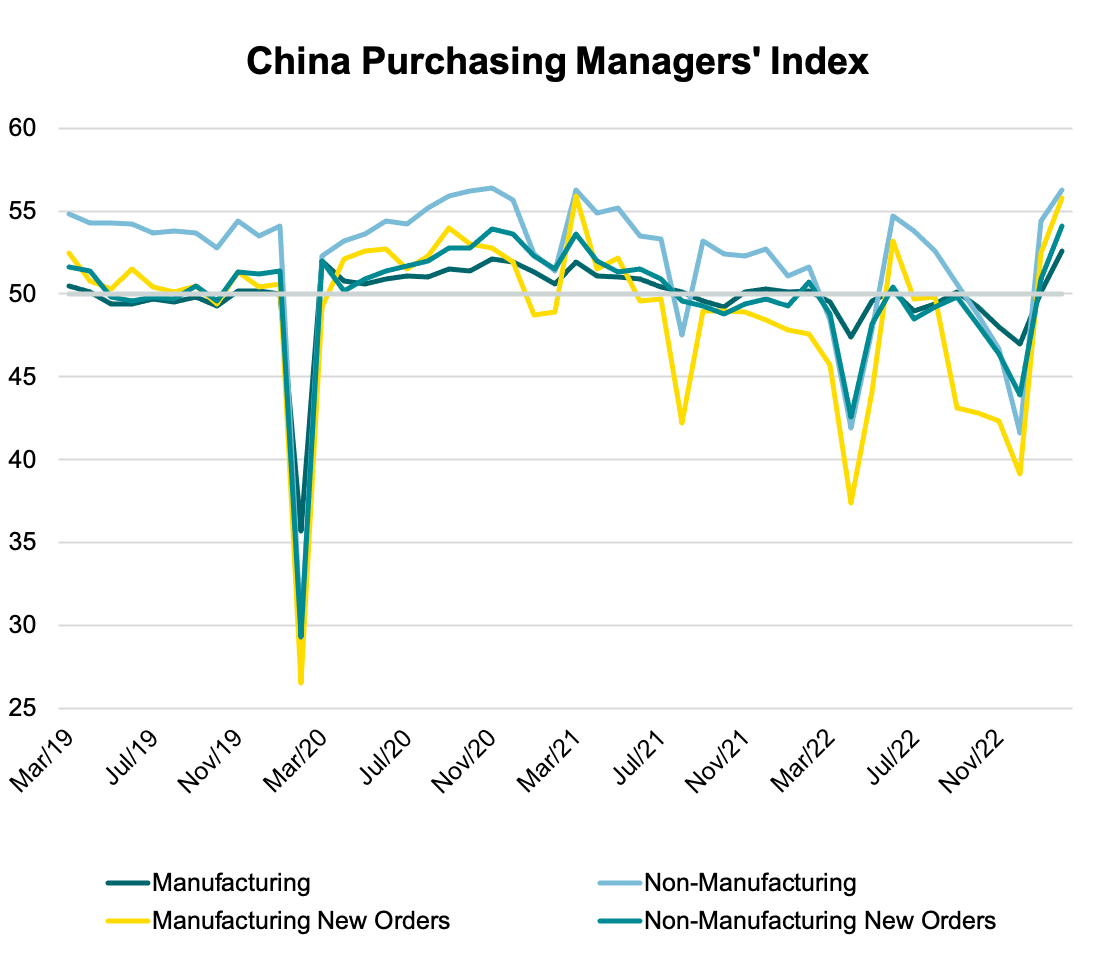It’s important to remember that SVB is not your typical bank. While most banks loan out deposits, thereby benefiting from rising interest rates, SVB invested its customers’ deposits in long-dated US government bonds. As interest rates rose, the value of these bonds fell, leading to SVB announcing a $1.75bn capital raise. Unsurprisingly, this spooked its heavily-tech-sector clients, leading to a run on the bank. So, are we facing a systemic banking crisis like the one we saw in 2008? Probably not.
Nevertheless, this jolt to the financial sector has put markets in a risk-off mode, which was compounded by the recent sale of Credit Suisse to UBS. In this kind of environment, what we think works is: owning more safe bonds and less equities than normal; having exposure to areas relatively insulated from the cause of these banking-sector stresses, such as Asia; owning low-volatility stocks; owning gold; having less exposure to emerging market and high-yield bonds, and to equity markets with a large bank weight such as the eurozone.
This is broadly how our flagship portfolios are positioned. And it’s also a reminder of why time in the market is more important than timing the market. We strive to remain invested (although tilting portfolios depending on our house view), and investing selectively while remaining true to one’s medium-term strategy is key. While we believe now is not the time to add equity risk to portfolios, we think investing with a quality bias means we can ensure the risk taken within portfolios is the right type of risk. Events such as SVB’s crisis demonstrate why long-term quality matters.


Daniele Antonucci, Chief Economist & Macro Strategist
Both current output and new orders improved significantly, while employment in both services and manufacturing crossed the 50-threshold to turn expansionary, suggesting that a consumption-driven recovery has room to run.
We expect growth in China to recover meaningfully in the coming months, with domestic strength outweighing a slowdown in activity elsewhere.

Source: In-house research, Refinitiv;
note: values > 50 = expansion; < 50 = contraction.
What’s happening?
Global recession fears have receded slightly, with persistently strong US economic data, lower natural gas prices (for Europe) and China’s reopening. Headline inflation marked a peak in mid-2022 but the peak in core inflation is less pronounced in the US/UK as services inflation remains hot. More notably, core inflation has not peaked just yet in the eurozone.
Before the US Congress in early March, Federal Reserve (Fed) Chair Powell turned hawkish again. This was an unexpectedly aggressive posture following the most recent step down in the pace of rate rises. The outlook for the European Central Bank (ECB) is also more uncertain, with risks of a higher terminal rate. Yield curves remain inverted (short-term interest rates remain higher than long-term ones), a sign that investors are concerned about growth.
This is where the dilemma surrounding the recent banking sector stresses and bouts of financial instability comes in. There were questions as to whether central banks would stay the course in their battle against inflation or pause hikes to ease pressure on the US and European banking sectors. Both the Fed and ECB stuck to their guns and raised rates in line with previous guidance (25 and 50 bps, respectively) signalling that they view inflation as the more dangerous factor at play for the US and European economies. That said, the Fed also signalled that it is close to pausing its hiking cycle.
Turning East, China will continue to support its economy without resorting to large-scale stimulus. Beijing set a conservative ~5% growth target, accounting for external headwinds.
What we’re watching
While one might usually expect resilient economic data to support stocks, February’s data led to a decline in developed market (DM) equities, as investors reassessed their expectations for both the peak in inflation and subsequent interest rate movements.
It appeared that too much optimism was priced in DM equity prices. With the Fed and ECB staying hawkish, we expect more downside risk to be priced in, as potential further rate rises would imply higher discount rates and slower growth. That said, the recent market volatility makes central banks’ trajectories more uncertain as it’s not obvious that they may continue to hike at a fast pace.
We anticipate 2023 to be a year of growth divergence, with China and Asia overall serving as growth hotspots in contrast to developed markets. Despite a recent market drop caused by geopolitical tensions, the ongoing economic reopening in China is an important source of optimism for investors in the near to medium term.
At risk of sounding like a broken record, we want to reiterate that we believe “bonds are back” and this is reflected in our recent changes in flagship portfolios. We have further reduced our exposure to emerging market (EM) credit and replaced this with safe developed market government bonds – a change that reduces the interest rate sensitivity of our portfolios. These changes mean our overall credit exposure has now reduced to a level lower than our typical long-term allocation. This month we also reduced our exposure to hard currency (USD) EM sovereign bonds. Instead, we have allocated to short-dated DM government bonds as yields are attractive.
Our equity allocations remain slightly lower than normal – we remain somewhat underweight. However, we reshuffled within equities by reducing our US and overall EM equities in favour for Asia-Pacific equities including Japan. This move gives us a more direct exposure to the reopening of China and the continued positive growth momentum across the region.
With inflation uncertainty lingering in Europe, we are still cautious on eurozone equities, despite their strong performance of late (prior to the latest bout of financial instability). We await more certainty on inflation trends and future growth before adding exposure to this cyclical market. The recent stresses in the banking system add an extra layer of uncertainty.

MACRO
Faster move past inflation/
Fed/bond yields peak
↓
Increase equity/fixed income

GEOPOLITICS
Russia/Ukraine
negotiations/end of war
↓
Increase EU equities/high-yield bonds

MACRO
China reopening
without major problems
↓
Increase EM/China risk exposure

POLICY
Central banks overtighten
even if inflation slows
↓
Reduce risk in equities & bonds,
add gold

GEOPOLITICS
Russia/Ukraine war
gets worse
↓
Reduce European risk exposure,
add gold

GEOPOLITICS
China/Taiwan/US
escalation
↓
Reduce EM/Asia
risk exposure

MACRO
European gas crisis
deteriorates again
↓
Reduce EU & UK
equities/high-yield bonds

MACRO
Wage-price spiral
pushing inflation higher
↓
Reduce bond exposure,
diversify further

FINANCIAL
Systemic banking crisis/
financial instability
↓
Increase safe bond exposure,
add gold
We take time to listen
Thank you for reading our monthly update.
Please contact us if you have any questions, remarks or suggestions regarding this update.
Take a look at our other publications below:
This document is designed as marketing material. This document has been composed by Quintet Private Bank (Europe) S.A., a public limited liability company (société anonyme) incorporated under the laws of the Grand Duchy of Luxembourg, registered with the Luxembourg trade and company register under number B 6.395 and having its registered office at 43, Boulevard Royal, L-2449 Luxembourg (“Quintet”). Quintet is supervised by the CSSF (Commission de Surveillance du Secteur Financier) and the ECB (European Central Bank).
This document is for information purposes only, does not constitute individual (investment) advice and investment decisions must not be based merely on this document.
Whenever this document mentions a product, service or advice, it should be considered only as an indication or summary and cannot be seen as complete or fully accurate. All (investment) decisions based on this information are at your own expense and at your own risk. It is up to you to (have) assess(ed) whether the product or service is suitable for your situation. Quintet and its employees cannot be held liable for any loss or damage arising out of the use of (any part of) this document. All copyrights and trademarks regarding this document are held by Quintet, unless expressly stated otherwise. You are not allowed to copy, duplicate in any form or redistribute or use in any way the contents of this document, completely or partially, without the prior explicit and written approval of Quintet. See the privacy notice on our website for how your personal data is used (https://www.quintet.com/en-gb/gdpr).
The contents of this document are based on publicly available information and/or sources which we deem trustworthy. Although reasonable care has been employed to publish data and information as truthfully and correctly as possible, we cannot accept any liability for the contents of this document.
Investing involves risks and the value of investments may go up or down. Past performance is no indication of future performance. Any projections and forecasts are based on a certain number of suppositions and assumptions concerning the current and future market conditions and there is no guarantee that the expected result will ultimately be achieved. Currency fluctuations may influence your returns.
The information included is subject to change and Quintet has no obligation after the date of publication of the text to update or inform the information accordingly.
Copyright © Quintet Private Bank (Europe) S.A. 2023. All rights reserved. Privacy Statement



















